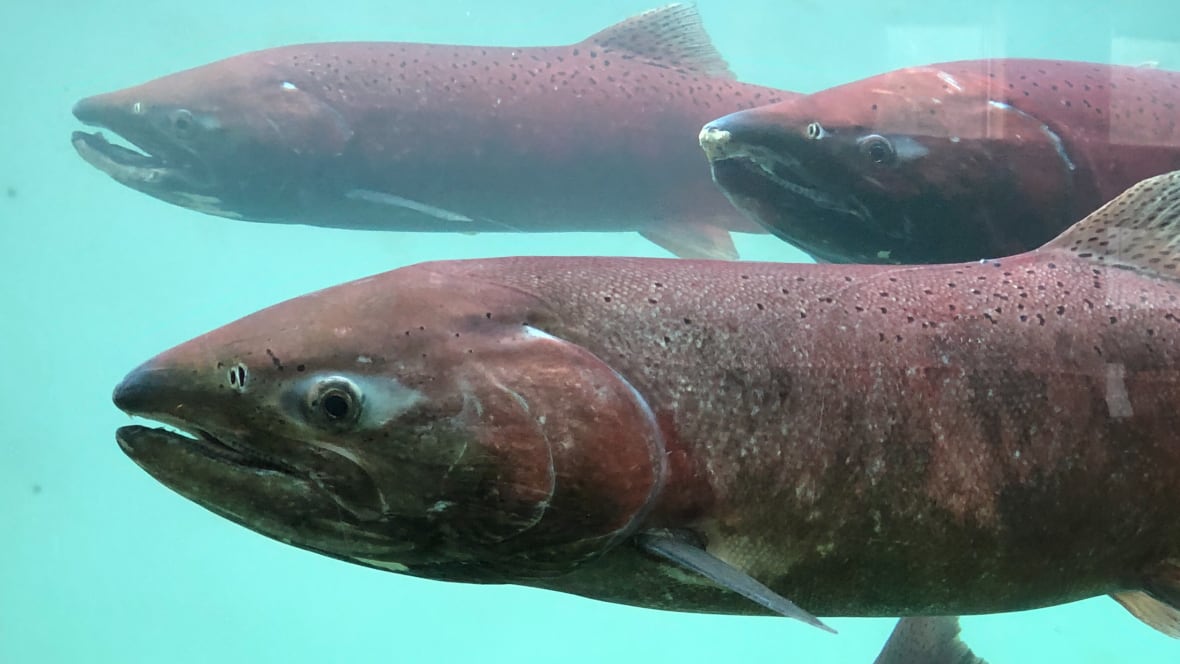Hard talk at Whitehorse dam hearing, with concerns about environment front and centre
The hearing, one of the largest since the Yukon Water Board’s inception, came to a close Friday

To Harold Gatensby, the Whitehorse hydroelectric dam evokes a sense of loss.
For years, Gatensby said, he's seen fewer animals like muskrat and the threatened chinook salmon. Some lakes, Gatensby said, have gone quiet. He blames what he calls the "largest factory of the North."
"You're taking our lifestyle away," he said. "We're losing the way we want to live.
"I want to live by the lake. I was raised up on the lake. I raised my children up on the lake. I know where the fish are, the moose are. I don't wanna let that go."
Gatensby, a member of the Carcross/Tagish First Nation (C/TFN), was one of dozens of people who spoke during the Yukon Water Board hearing into the dam.
The hearing, likely the largest since the board's inception, is a vital part of the relicensing process.
Yukon Energy's proposal has been moving along, having cleared the Yukon Environmental and Socio-economic Assessment Board. The company wants a 20-year licence.
Residents' associations, First Nations, the Yukon government and individuals all converged for more than a week of deliberations.
Many are demanding system-wide changes, including increased water level data in the face of climate change and immediately coming up with ways to better protect fish. The hearing represented an opportunity for people to air grievances and suggest solutions.
Together, those submissions will help the board decide whether to issue a licence and decide what conditions to place on that licence.
Fish protections remain top concern
The three First Nations present pointed to ongoing impacts to fish, especially the imperilled chinook salmon.
For too long, First Nations spokespeople said, salmon and fresh water species have been sucked into the dam and killed or injured. New research suggests thousands of fish may be killed as they swim through the dam, with the biggest threat being the dam's four turbines.
First Nations suggest Yukon Energy hasn't yet done enough to ensure safe passage.
All are pushing for immediate changes. That includes shutting off certain turbines during key migration periods, revamping the fish ladder and changing the rate at which water flows through the dam, which Yukon Energy controls.
Catherine Ford-Lammers, project lead with the C/TFN, said she's not putting her trust in Yukon Energy, but rather the board.
Ford-Lammers said there continue to be too many unknowns, among them, undefined protections for chinook salmon and freshwater fish, with no associated timelines.
That's why she wants the board to ensure strong protections for the land and water.
"It is C/TFN's concern that without timelines and requirements, none of these improvements for fish and salmon will ever be fulfilled or fulfilled too late for the chinook salmon," she said.

The Ta'an Kwäch'än Council and the Kwanlin Dün First Nation have agreed to 20-year licence term. The C/TFN wants 10 years instead because, the First Nation says, Yukon Energy hasn't done enough planning to protect the environment to warrant a longer licence term.
The First Nation also wants to see a new board created, made up of the three affected First Nations, and public oversight into the future.
Seven calls to action
Rae Mombourquette, with the Kwanlin Dün First Nation, said the dam has long upended traditions by disconnecting citizens from the land and killing fish. She said it's also altered the environment, inundating blueberry patches and fish camps. Some of those are now submerged by Schwatka Lake, the dam's reservoir.
The First Nation has issued seven calls to action. They include restitution for citizens long displaced by the dam, environmental harms including fish kill, affirming harvesting rights and public apologies.
"Regardless of the outcomes this week, we are still here," Mombourquette said. "We are river people, even if most of us have moved away from the river. We are still salmon people, even if we cannot currently harvest or consume salmon.
"Respected members of the Yukon Water Board, you have this week an incredible opportunity to take a meaningful step towards repair and towards reconciliation. Take it."
Kwanlin Dün Elder Pat Joe called the Whitehorse dam a "monster."
"Salmon is the reflection of our people. They've suffered like us. They've suffered too much."
Yukon Energy responds
Kirsten Hogan, a consultant with Yukon Energy, said the company has made progress in some areas like collecting data and adjusting flows to attract more fish to the ladder, which is being kept open for longer periods of time.
Hogan said the company isn't "shirking responsibility."
"What we know now is good information, and we know that we have more to learn," she said. "The board should be confident that the evidence presented by Yukon Energy supports a 20-year licence term."
But Hogan admitted the company has introduced no new protections in the last two years. She said work is underway to change that, in a process that will happen over time. Hogan said effects need to be fully understood before mitigations are set in place.
Jason Herbet, legal counsel with Yukon Energy, acknowledged the lasting impacts of the dam on the affected First Nations.
"Members of the three nations have spoken very eloquently over the course of this hearing," he said. "I have been personally moved by their words.
"At the same time, the Whitehorse Rapids Generating Station is a critically important generation asset in Yukon's deeply interconnected electrical system. Yukoners today have reliable access to affordable and mostly renewable electricity every day of the year."
On Friday, the final day of the hearing, Piers McDonald, chair of the board, said the implications of the hearing are significant as they are vast.
"In my public life, I can't think of a more significant time other than perhaps the land claims agreement negotiations," he said. "The outcomes will matter to people in this territory for generations to come."

